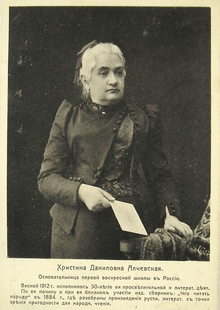Khrystyna Alchevska
Khrystyna Danylivna Alchevska, née Zhuravlyova (Ukrainian: Христина Алчевська; Xrystyna Alčevs’ka) (1841–1920) was a Ukrainian teacher and a prominent activist for national education. She created a methodical training system which was implemented in many schools of Russian Empire. In 1862, she organized the first free girls' school in Ukraine. In 1889, she was elected vice-president of the International League of Education in Paris.

Biography
Khrystyna was born 16 April 1841 in Borzna, Chernihiv gubernia, now in Ukraine. She married Alexey (Oleksii) K. Alchevsky, a Ukrainian businessman, later owner of a large mine and steel plant. Their children numbered many talented and accomplished artists. Son, Ivan Alchevsky, was a renowned opera singer. Daughter, Khrystia Alchevska, was a poet. Son, Hryhorii Alchevsky, was a composer.[1]
She lived and worked in Kharkiv where died on 15 August 1920.
Professional life
Beginning in 1862, she maintained the Kharkiv Women's Sunday School (officially accredited in 1870) at her own expense. The school remained in existence for 50 years and was renowned for its highly developed methods of adult education. Borys Hrinchenko taught at the school as a young man. She was an eminent pedagogue who initiated a method of adult education using literary works, rather than spelling books. In 1889, she attended the Paris Exhibition as the representative of Russian Empire teachers of adult students. She taught classes in Ukrainian until forced by the government to switch to Russian.[2]
Alchevska compiled an award-winning methodological and bibliographical guide, What the People Should Read, (Chto chitat’ narodu) in 1906. This work earned the grand prize at the Paris International Exhibition, and a teaching manual, Book for Adults (Kniga vzroslykh) in 1900. She also wrote a memoir, My Thoughts and Experiences ("Peredumannoe i perezhitoe), in 1912. She also published several methodological articles on adult education. In the 1860s, Alchevska's articles appeared in Aleksandr Herzen's journal Kolokol, under the pseudonym Ukrainka. Alchevska encouraged girls and women to dress in traditional regional costumes at community festivals and to perform folksongs. She wore peasant costume as a symbol of her dedication to the people she taught. Her adaptation of folk culture and folk art helped peasants adjust to city life.[3]
Legacy
In 1963, O. Mazurkevych published a book on the educational work of Alchevska and her colleagues.
References
- Kubijovyc, Volodymyr (2016). Encyclopedia of Ukraine: Volume I: A-F. Toronto, Canada: University of Toronto Press. ISBN 9781442651173.
- Peter J. Potichnyj, Marc Raeff, Jaroslaw Pelenski, Gleb N. Zekulin , eds (1992). Ukraine and Russia in Their Historical Encounter. Edmonton, Alberta: Canadian Institute of Ukrainian Studies Press University of Alberta. p. 118.CS1 maint: multiple names: authors list (link) CS1 maint: extra text: authors list (link)
- Bohachevsky-Chomiak, Martha (1988). Feminists Despite Themselves: Women in Ukrainian Community Life, 1884-1939. Edmonton, Alberta, Canada: Canadian Institute of Ukrainian Studies, University of Alberta. p. 19. ISBN 9780920862575.